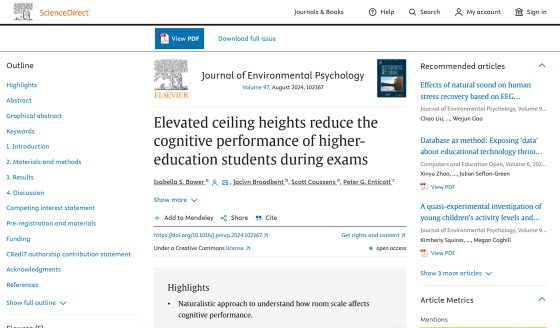Taking a test in a room with high ceilings may result in poorer performance

It is known that test scores are influenced by factors such as previous study and the condition of the day, as well as factors such as '
Elevated ceiling heights reduce the cognitive performance of higher-education students during exams - ScienceDirect
https://www.sciencedirect.com/science/article/pii/S0272494424001403

High ceilings linked to poorer exam results for uni students - News and events - University of South Australia
https://www.unisa.edu.au/media-centre/Releases/2024/high-ceilings-linked-to-poorer-exam-results-for-uni-students/
High Ceilings in Buildings Linked to Poorer Exam Results For Students: ScienceAlert
https://www.sciencealert.com/high-ceilings-in-buildings-linked-to-poorer-exam-results-for-students
In a previous study using VR and brain mapping techniques, environmental psychologist Isabella Bauer of the University of South Australia and her team found that the perceived size of a room affects human cognitive performance: simply sitting in a large room elicited brain activity associated with concentrating on a difficult task.
'Based on these results, we wanted to apply our lab findings to a real-world dataset to see if performance would suffer if people had to concentrate on a critical task in a large space like a gymnasium,' Bauer said.
To investigate the relationship between room size and test performance, the team analyzed eight years of exam results from three Australian university campuses, covering a total of 15,400 students. They compared the grades predicted by the students' submitted work in the same class with the grades they actually achieved in the test.

After taking into account factors such as age, gender, time of test, test subject, and previous test results, the researchers found that students who took the test in a 'room with a high ceiling' tended to perform worse than expected compared to students who took the test in a 'room with a normal size.'
It's difficult to determine whether this result is due to the size of the rooms themselves, or to factors such as student density or poor insulation. 'These spaces are often designed for purposes other than testing, such as gymnasiums, exhibitions, events, and performances,' Bauer said. 'We need to understand the mechanisms behind the association and the extent to which it affects students.'
Co-author Associate Professor

◆ Forum is currently open
A forum related to this article has been set up on the official GIGAZINE Discord server . Anyone can post freely, so please feel free to comment! If you do not have a Discord account, please refer to the account creation procedure article to create an account!
• Discord | 'Which do you feel more comfortable in: a room with a high ceiling or a room with a low ceiling?' | GIGAZINE
https://discord.com/channels/1037961069903216680/1260159848784461898
Related Posts:
in Science, Posted by log1h_ik







